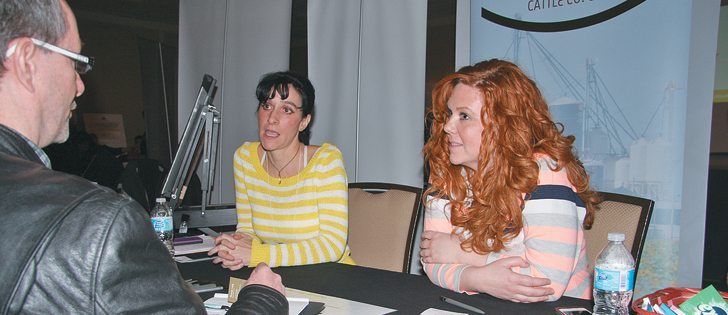Wanted: 300 people to pull weeds in seed canola fields. No experience necessary.
That was one of the employment pitches at a March 4 agricultural job fair in Lethbridge, where 19 employers, ranging from food processing to feedlots, explained their employment needs.
They were looking for engineers, electricians, salespeople, meat cutters and weed pullers.
Shortage of labour continues to be a problem for farms and agribusinesses in Alberta, as it is across the Prairies. However, the problem is compounded in this agriculturally rich region by competition from the oil and gas industry and difficulties with the foreign worker program.
Read Also

Farming Smarter receives financial boost from Alberta government for potato research
Farming Smarter near Lethbridge got a boost to its research equipment, thanks to the Alberta government’s increase in funding for research associations.
Rhonda Lang handles human resources for the Kasko Cattle Co., which operates four feedlots in southern Alberta. She said feedlots are no longer designated as primary agriculture businesses under foreign worker program rules.
Feedlots’ new designation as agribusiness has lengthened the approval time for hiring and imposed additional wage requirements.
“It’s frustrating that the government is making it hard for us to bring more foreign workers over because they’re the ones who I feel I have the (best chance) of keeping because they want to work,” said Lang.
Employee retention is a problem at many cattle feeding operations in the Lethbridge area.
Lang said workers in processing jobs — unloading and sorting cattle and administering vaccinations — have the highest turnover and often quit without notice.
“Typically when they leave we don’t get the two week notice or the one week notice. They just don’t show up,” he said.
“So we’ve really been spending lots of time recruiting foreign workers. They seem to be the most dedicated to coming and working hard and wanting to stay on.”
Alan Dooley of Alberta Agriculture’s agricultural labour recruitment division, said the province’s unemployment rate is 4.6 percent, which is statistically considered to be full employment.
However, there are still Albertans who want jobs.
“We do work with the temporary foreign worker program and it has its place, but our first priority is to Albertans and permanent residents and to make sure they at least get some opportunities for work,” he said.
David Kunst, manager of Select Temp, said he thinks the labour shortage will worsen this year. His company recruits employees on behalf of others, and he was at the job fair to find roguers, or weed pullers, in seed canola fields contracted by Dow AgroSciences.
“In my opinion, this summer we’re going to see a large hit in our employment,” he said.
“We’re starting to see it a little bit. Not as bad as 2008, but we’re seeing the effects of the oilsands and as well with so much oil coming up in Taber and that Brooks area. That’s the hardest hit area and that’s where a lot of the agriculture is.”
Many agricultural and food processing jobs can’t compete with oil patch wages, but money isn’t the entire picture.
“We’re pretty competitive wage wise. We try to maintain that within the food manufacturing group,” said David Duske, human resource manager with Lamb Weston.
“We can’t compete with oil and gas or maybe construction. It’s a different industry,” he said.
“The flip side of that is we’re very consistent. We’re a 24-7 operation all year round and very consistent, very steady. Some of these other industries can be very up and down.”
Lamb Weston, a division of ConAgra, operates a potato processing plant east of Taber that employs 260 people. Its current labour needs include tradesmen, millwrights and production employees.
Ag Growth International, which builds grain bins and augers in a large manufacturing plant in Nobleford, Alta., was at the job fair seeking sales representatives and engineers.
“In general, I think agriculture kind of gets a bad name for having lower wages. I think that the money can be there if you have the right skill set,” said AGI human resources manager Heather Meller.
Cattle slaughter facilities are among the agribusinesses constantly seeking workers. Representatives from JBS in Brooks and Cargill in High River were recruiting at the job fair, with hundreds of positions available.
Laszlo Bodor of Cargill said the work can be difficult but wages starting at $17.30 per hour are higher than many other jobs, and they come with stability, benefits and a pension plan.
“We’re working hard to improve our retention, but it is up to each individual, and the competition, of course,” Bodor said.
“There are a lot of people competing for the same person.”
A list of upcoming Alberta job fairs can be found at humanservices.alberta.ca/jobfairs.


















